Edit, Download, and Sign the California Revocable Transfer on Death Deed Instructions
Form
eSign
Add Annotation
Share Form
How do I fill this out?
This section provides an introduction on how to fill out the Revocable Transfer on Death (TOD) Deed form. It details the process step-by-step to ensure accurate completion. Follow the guidelines carefully to avoid any mistakes.
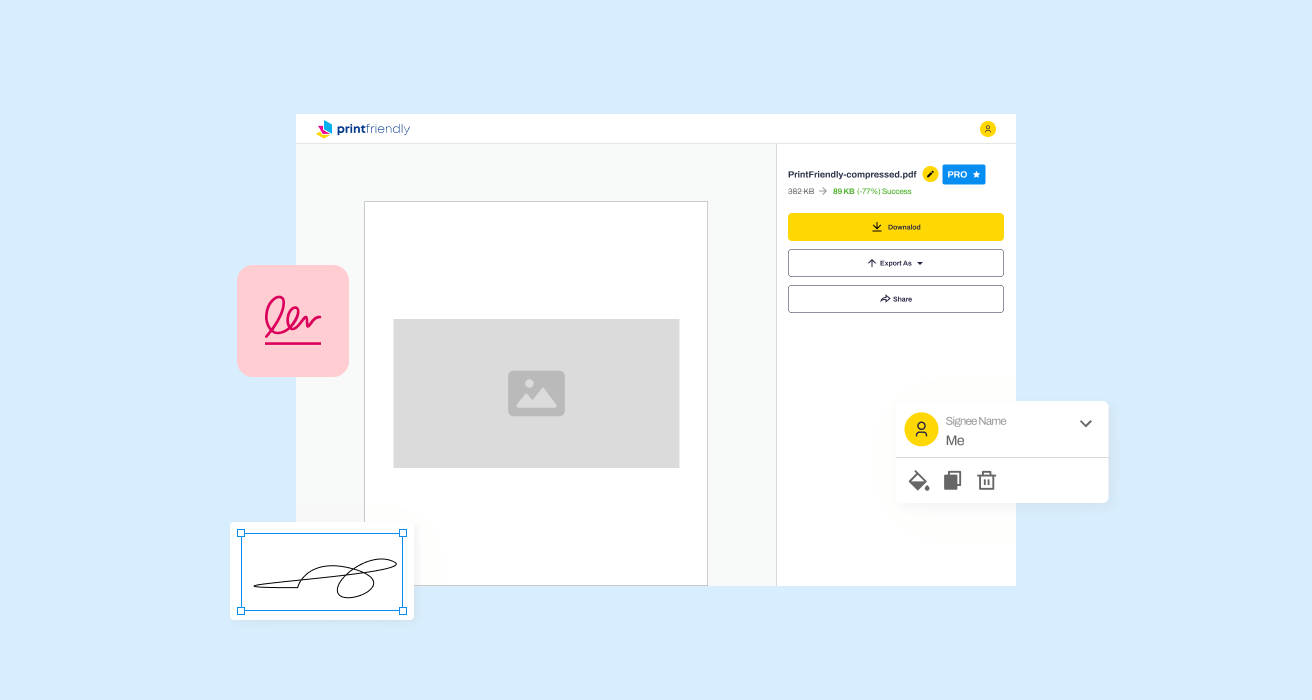
How to fill out the California Revocable Transfer on Death Deed Instructions?
1
Print the legal description of the residential property.
2
Name the beneficiaries who will receive the property.
3
Sign and print your name as the declarant.
4
Witnesses must sign and print their names.
5
Notarize the form and record it within 60 days.
Who needs the California Revocable Transfer on Death Deed Instructions?
1
Homeowners who want to transfer their property to beneficiaries without probate.
2
Individuals looking to simplify the transfer of residential property upon death.
3
Estate planners who require a revocable deed option for their clients.
4
Attorneys advising clients on property transfer options.
5
Beneficiaries who need documentation of the intended transfer of property.
How PrintFriendly Works
At PrintFriendly.com, you can edit, sign, share, and download the California Revocable Transfer on Death Deed Instructions along with hundreds of thousands of other documents. Our platform helps you seamlessly edit PDFs and other documents online. You can edit our large library of pre-existing files and upload your own documents. Managing PDFs has never been easier.

Edit your California Revocable Transfer on Death Deed Instructions online.
With PrintFriendly, you can easily edit this PDF by uploading the file to our platform. Use our editing tools to make changes to any fields or information. Save the edited document once you're satisfied with the updates.

Add your legally-binding signature.
PrintFriendly allows you to sign PDFs electronically. Upload your document, use the signature tool to add your signature, and save the signed file. This ensures your document is thoroughly completed and ready for submission.
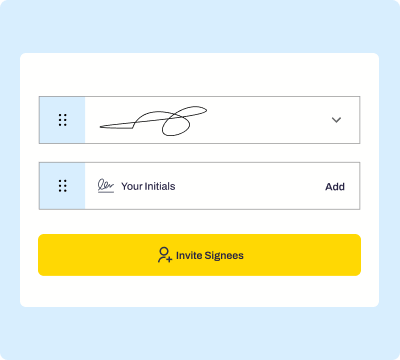
Share your form instantly.
Share your edited and signed PDF through PrintFriendly's sharing feature. Upload your document, make the necessary edits or signatures, and use the share option to send the file to your desired recipients. This makes document sharing fast and convenient.
How do I edit the California Revocable Transfer on Death Deed Instructions online?
With PrintFriendly, you can easily edit this PDF by uploading the file to our platform. Use our editing tools to make changes to any fields or information. Save the edited document once you're satisfied with the updates.
1
Upload the PDF file to PrintFriendly.
2
Use the editing tools to enter or modify information.
3
Ensure all required fields are accurately filled.
4
Review the edited document for any errors.
5
Save and download the completed PDF.

What are the instructions for submitting this form?
To submit this form, take the completed and notarized form to the county recorder's office where the property is located. Follow the specific instructions given by the county recorder to ensure proper submission. It's recommended to consult an attorney if you have any doubts about the process.
What are the important dates for this form in 2024 and 2025?
The form must be recorded within 60 days of notarization. Ensure timely submission to avoid any legal issues.

What is the purpose of this form?
The purpose of the Revocable Transfer on Death (TOD) Deed form is to allow homeowners to transfer their residential property to named beneficiaries upon death without the need for probate. This form provides a straightforward and cost-effective way to manage estate planning and ensure a smooth transfer of property. It helps in reducing the legal complexities and expenses associated with probate proceedings.

Tell me about this form and its components and fields line-by-line.

- 1. Property Description: Print the legal description of the residential property.
- 2. Beneficiary(ies): Name the individuals or entities who will receive the property upon your death.
- 3. Declarant Information: Sign and print your name as the person transferring the property.
- 4. Witness Information: Two witnesses must sign and print their names to validate the form.
- 5. Notarization: Your signature must be notarized by a notary public.
What happens if I fail to submit this form?
Failing to submit the form within the required timeframe can result in the form being ineffective.
- Legal Invalidation: The deed will not be recognized legally if not submitted within 60 days.
- Probate: The property may need to go through probate, negating the purpose of the TOD deed.
How do I know when to use this form?

- 1. Estate Planning: To simplify the transfer of property upon death.
- 2. Probate Avoidance: To avoid the legal complexities and expenses associated with probate.
- 3. Legal Compliance: To ensure the transfer of property is done in accordance with California law.
Frequently Asked Questions
What is a TOD Deed?
A TOD Deed allows you to transfer residential property to named beneficiaries without probate upon your death.
Can I use this deed for nonresidential property?
No, this deed can only be used to transfer residential property.
How do I notarize my signature?
Sign the form in the presence of a notary public who will notarize your signature.
Do witnesses need to notarize their signatures?
No, witnesses' signatures do not need to be notarized, only the declarant's signature does.
How do I find the legal description of the property?
The legal description may be found on the property deed or at the county recorder's office.
How can I revoke the TOD Deed?
You can revoke the TOD Deed by recording a revocation form, creating and recording a new TOD Deed, or transferring the property before your death.
Can a beneficiary be a witness?
Yes, but it can cause legal issues. It's best to use non-beneficiary witnesses.
Do I need an attorney to complete this form?
It's recommended to consult an attorney, but it's not required.
Where do I record the completed form?
Record the form at the county recorder's office where the property is located.
What happens if I don't record the form within 60 days?
If the form is not recorded within 60 days, it will not be effective.
Related Documents - California TOD Deed
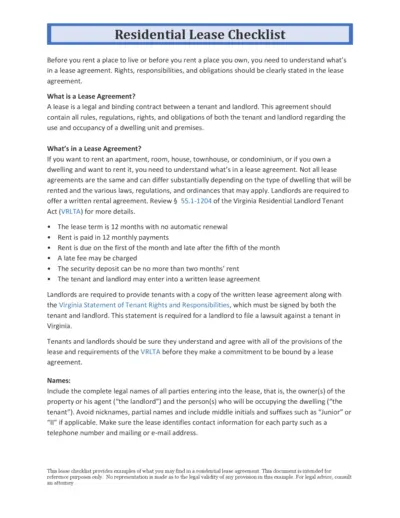
Residential Lease Agreement Checklist for Tenants and Landlords
This document provides a detailed checklist of what both tenants and landlords need to know and include in a residential lease agreement. It covers key elements such as lease terms, rent payment schedules, and maintenance responsibilities. Use this guide to ensure all rights and obligations are clearly outlined in your lease agreement.
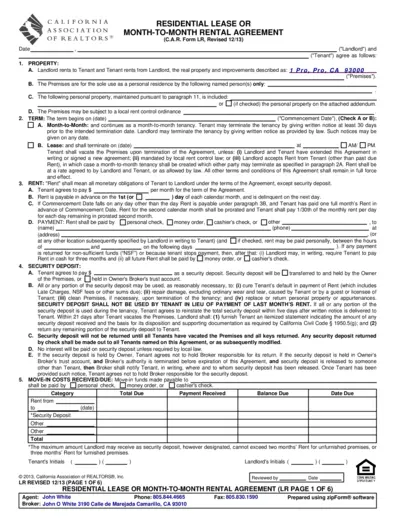
Residential Lease or Month-to-Month Rental Agreement
This file contains a comprehensive residential lease or month-to-month rental agreement used in California. It provides details on terms, obligations, and conditions for both landlords and tenants. Perfect for those seeking a standardized rental agreement form.
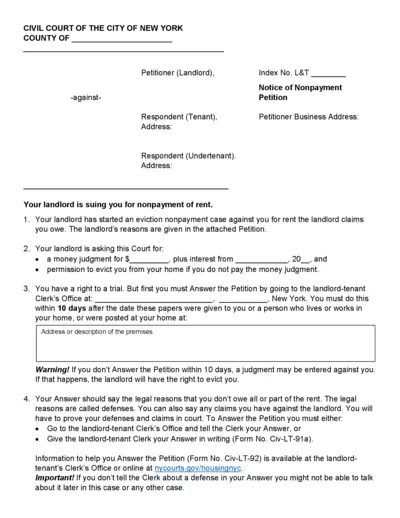
Civil Court of the City of New York Nonpayment Petition
This document is a Notice of Nonpayment Petition issued by the Civil Court of the City of New York. It details the actions that a landlord can take against a tenant for nonpayment of rent. It includes instructions on how the tenant can respond and their rights.
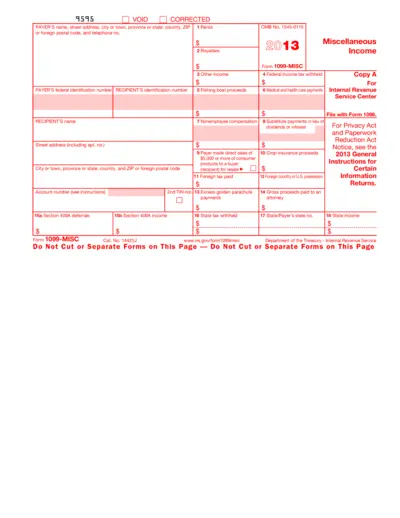
Form 1099-MISC: Miscellaneous Income for 2013
This file is a 2013 version of the IRS Form 1099-MISC used to report miscellaneous income. It includes fields for reporting various types of payments made to individuals or entities. The form is typically filed by payers to report income paid to recipients.
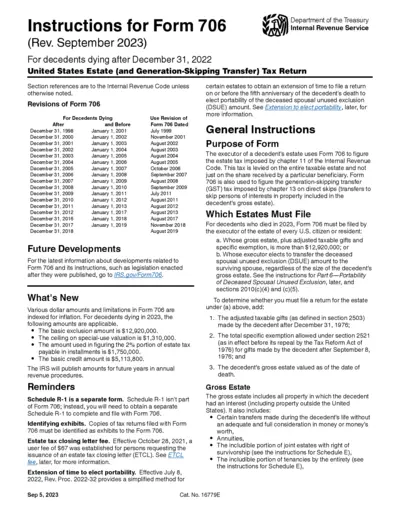
Instructions for Form 706 (Rev. September 2023)
This document provides detailed instructions for completing Form 706, the United States Estate (and Generation-Skipping Transfer) Tax Return for decedents dying after December 31, 2022. It includes information on revisions, general instructions, and specific filing requirements. The instructions also cover important updates and reminders related to the form.
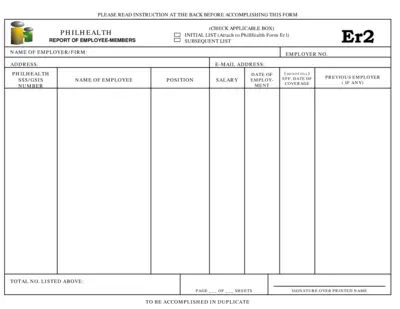
PhilHealth Report of Employee-Members Form Instructions
This file provides instructions for employers on how to fill out and submit the PhilHealth Report of Employee-Members form. It is essential for employers to report new hires to PhilHealth to ensure proper coverage. Detailed instructions and requirements are included.
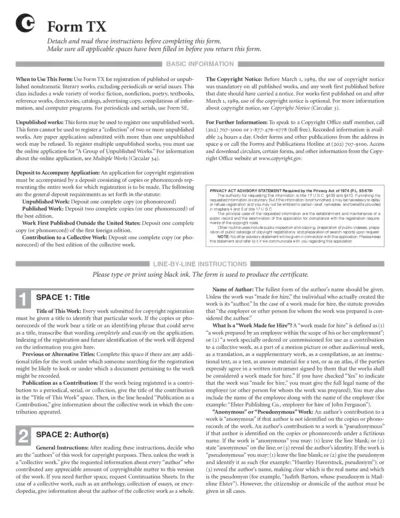
Copyright Registration Form TX Instructions
This form is used for the registration of nondramatic literary works, such as fiction, nonfiction, poetry, textbooks, and computer programs. It provides detailed information on how to complete the form, including what information is required for each section and how to submit the application. Use it to ensure your work is properly registered for copyright protection.
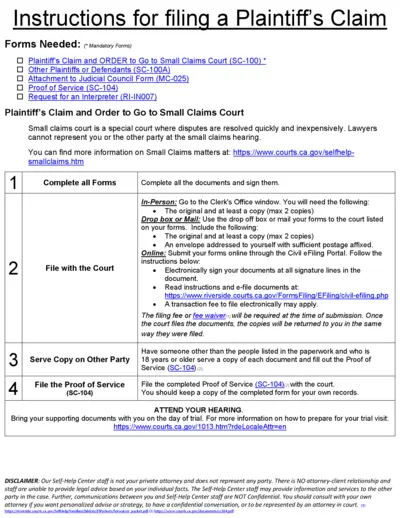
Plaintiff's Claim and Instructions for Small Claims Court
This file provides instructions and necessary forms for filing a Plaintiff's Claim in Small Claims Court. It includes details on filling out, submitting, and serving the forms. Ensure to follow the steps carefully to protect your rights.
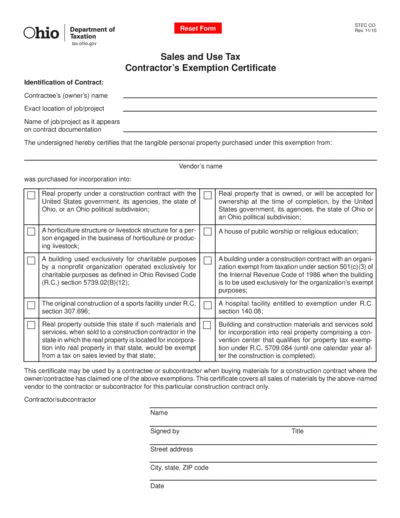
Ohio Sales and Use Tax Contractor's Exemption Certificate
This document is the Ohio Sales and Use Tax Contractor's Exemption Certificate. Contractors use this form to claim exemptions on certain taxable goods for specified exempt uses. It's crucial for contractors working with tax-exempt entities or on tax-exempt projects.
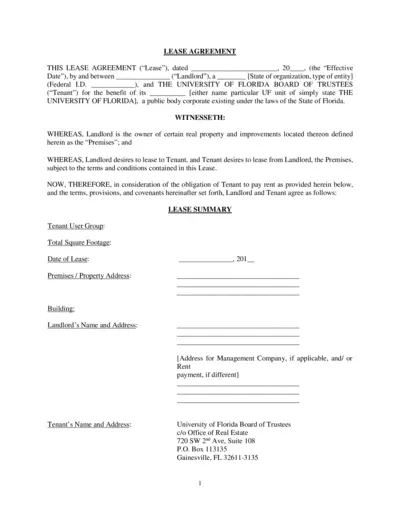
Lease Agreement for University of Florida Premises
This lease agreement file outlines the terms and conditions for renting a property owned by the Landlord to the University of Florida Board of Trustees. It covers key aspects such as lease term, rent details, improvements, and permitted use. Ideal for landlords and tenants involved in leasing agreements.
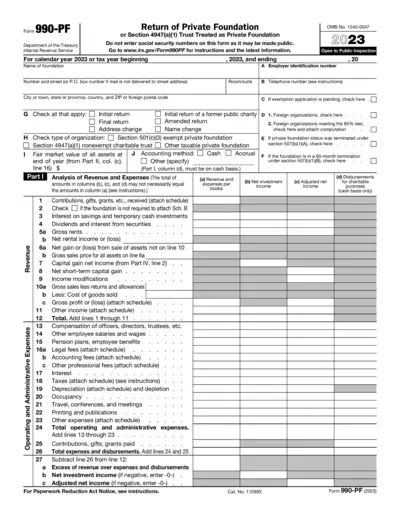
Return of Private Foundation Form 990-PF 2023
Form 990-PF is a return for private foundations required by the IRS. It includes information on revenue, expenses, and other financial details. Avoid entering social security numbers on this form.
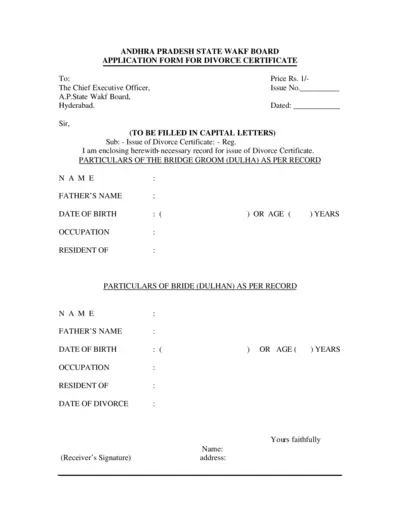
Application Form for Divorce Certificate - Andhra Pradesh State Wakf Board
This form is used to apply for a Divorce Certificate from the Andhra Pradesh State Wakf Board in Hyderabad. The form requires details of both bride and groom as per recorded information. It also includes fields for verification and office use only.